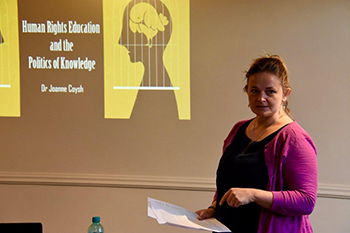Latest News Archive
Please select Category, Year, and then Month to display items
01 January 2020
|
Story Eugene Seegers
|
Photo Kaleidoscope Studios | Sonia Small
 Dr Maria Madiope took over the reins of the UFS South Campus at the beginning of January 2020.
Dr Maria Madiope took over the reins of the UFS South Campus at the beginning of January 2020.
The Council of the University of the Free State (UFS) approved the appointment of Dr Maria ‘Marinkie’ Madiope as Principal of the South Campus for Open Distance Learning (ODL) during a meeting held on 20 September 2019. Dr Madiope took over the reins of the UFS South Campus at the beginning of January 2020.
Educator at heart
Educating and empowering others are key aspects of Dr Madiope's life. She has served as the Director for University Teaching and Learning at Unisa since 2015 and takes her role incredibly seriously, achieving a transformative curriculum at the colleges under her care since her appointment.
Dr Madiope holds a PhD in Education from Unisa, with a specialisation in Didactics; her next two degrees where completed at the then RAU, which is today known as the University of Johannesburg: a BEd in 1999, followed by an MEd in 2001, both specialising in Computer-based Instruction. She previously obtained her BA Ed in 1985 and a BEd in 1988 from the University of the North. Her initial training as a teacher was from the Hebron College of Education from 1980-81.
Dr Madiope is also the editor of the only journal in ODL, Progressio, since 2016. Her expertise in E-learning is another of her strong points. Together with her team, Dr Madiope designed and developed the first online course in Curriculum Transformation, which is being piloted at Unisa. Her work has been rewarded with awards such as the Unisa Gender Activism: Advocacy and Promotion of Women’s Rights 2013, Unisa Woman of the Year 2013, and Unisa Best Performer 2013.
Dr Madiope brings with her a wealth of experience to UFS and her vision is to increase access to a wider base of learners with potentially having more African learners enrolled. The first point of call would be to have more learners coming from Lesotho and then the rest of the SADEC region, having the UFS become a leading distance-learning university. One of the key projects that Dr Madiope wishes to tackle is early childhood development. “I believe in educating educators to ensure that they are best equipped to provide the latest and relevant Early childhood and development practices that are on par with the rest of the world,” she says.
Community leader
In addition to being an experienced educator and administrator, Dr Madiope is instrumental in community projects that lie close to her heart. Whether it is large-scale advocacy for women’s rights or her personal involvement in the supply of sanitary towels for schoolgirls as part of a programme to empower the girl child through exposing them to options, it is humbling to watch her compassion in action.
She further intends to strengthen the relationship of the university with TVET Colleges and community colleges by providing mutually beneficial programmes that will up-skill those colleagues by giving them an opportunity to work with experienced UFS staff members. She says, “Reaching out to colleagues in TVET and Community colleges will offer them the opportunity to advance their lecturing and learning programmes, which will only lead to benefiting their learners and South Africa as a whole.”
IRSJ Research Fellow promotes human rights transformation
2017-10-05

Dr Joanne Coysh and Dr Sahar Sattarzadeh attend the
launch of Human Rights Education and
the Politics of Knowledge.
Photo: Luis Escobedo D’Angles
Dr Joanne Coysh is a multi-talented individual who has designed, facilitated, and accompanied participatory processes for research, learning, and change. She is also a postdoctoral research fellow from the University of Warwick, in the UK, and is working at the Institute for Reconciliation and Social Justice (IRSJ) at the UFS. Dr Coysh’s book, Human Rights Education and the Politics of Knowledge, was launched at the Centenary Complex on the Bloemfontein Campus by the IRSJ on 15 August 2017.
Connecting theory with practice
In the book, she argues that the traditional ways in which human rights education is conducted often become an obstacle. Based on her work on participatory group processes, Dr Coysh is uniquely positioned to bring a different and more practical, even radical, angle to the process of human rights education. Her purpose with the book is to connect theory to practice in order to design processes through which people begin to take positive and transformative decisions and actions. These not only have the potential to transform lives but our relationships with each other and the world in which we live as well.
Teaching and learning from the bottom up
When working with individuals and groups, Dr Coysh believes that they should be engaged, enabled, and empowered throughout the process. Not only does she explore real problems in context, but when doing her work, she also believes in encouraging respect for existing research and knowledge.
Her international experience in education and working in communities has allowed her to integrate global best practices into local application, allowing her to explore the big picture as well as local context. Having mastered the art of balancing theory with practice, research with reality, and facilitation with integration, her book shows how this dance can turn human rights education into human rights transformation.